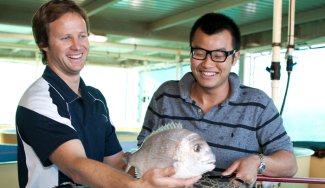

Why choose this course?
Turn the ocean into your office with a career in the aquaculture industry. This qualification will provide you with the practical skills and knowledge to manage the operations of fish farms, marine farms and hatcheries. You will learn skills in developing and implementing a breeding strategy, planning ecologically sustainable practices, biosecurity, managing stock health, developing a stock production plan, managing staff and business operations and developing marketing strategies that comply with government regulations and restrictions.
Our campuses have extensive salt and freshwater aquaculture facilities that will enable you to acquire practical, hands on training that relates directly to the aquaculture industry.
Students at Geraldton campus will have access to the Batavia Coast Maritime Institute (BCMI) for a minimum of three days per week in a simulated workplace and aboard the training vessel master class.
Career opportunities
- Hatchery Manager
- Hatchery Technician
-
An IELTS score (academic) of 6.0 with no band score less than 5.0 or equivalent.
-
Completion of SFI30119 Certificate III in Aquaculture is required for entry into this course.
There may be further semester intakes available for enrolment. You can view any further intakes when you submit your online application(opens in a new tab).
For information about pathways from TAFE to university, view our Pathways to university page.
How to apply
Apply to study at TAFE in six steps:
- find a course;
- check entry requirements;
- submit an application;
- accept your offer and pay;
- apply for your student visa; and
- receive your visa and come to Australia for your studies.
Build your own course guide
Select the study areas, courses and topics you like. Get your custom guide by email!
Download study area guide(opens in a new tab)
Contact us(opens in a new tab)
TAFE International Western Australia (TIWA) is the Registered Training Organisation (RTO) and Commonwealth Register of Institutions and Courses for Overseas Students (CRICOS) provider, for the delivery of training to international students, enrolled in a TAFE course in Western Australia. This nationally recognised course is delivered by a Western Australian TAFE college on TIWA's behalf. TIWA retains responsibility for the quality of the training and assessment delivered by the TAFE colleges and for the issue of certification documentation to students.


